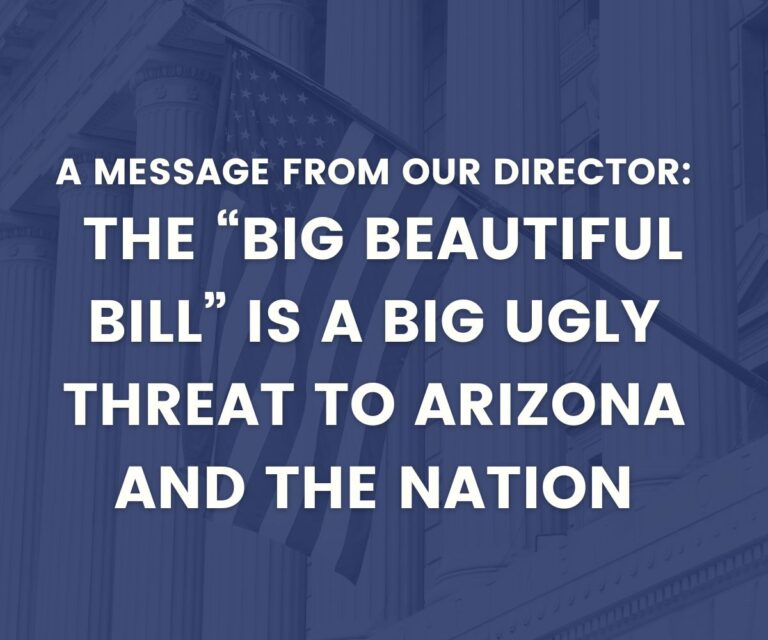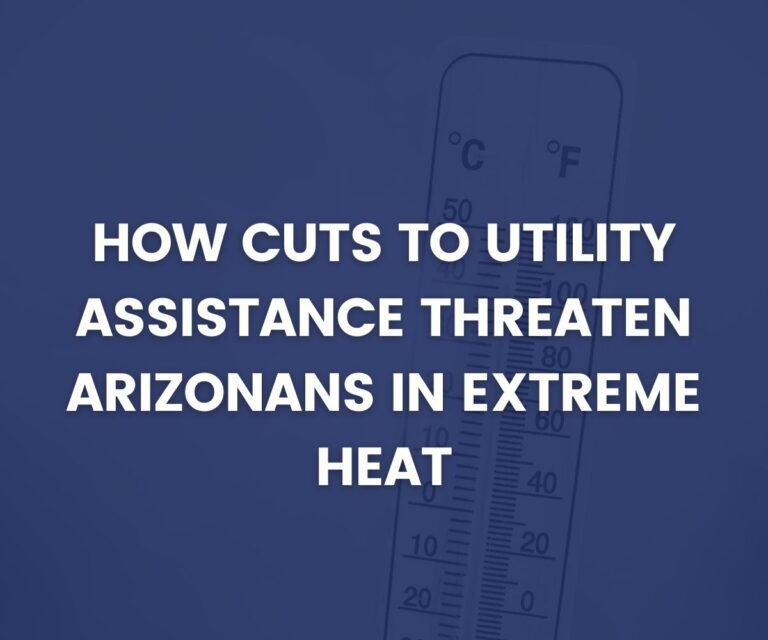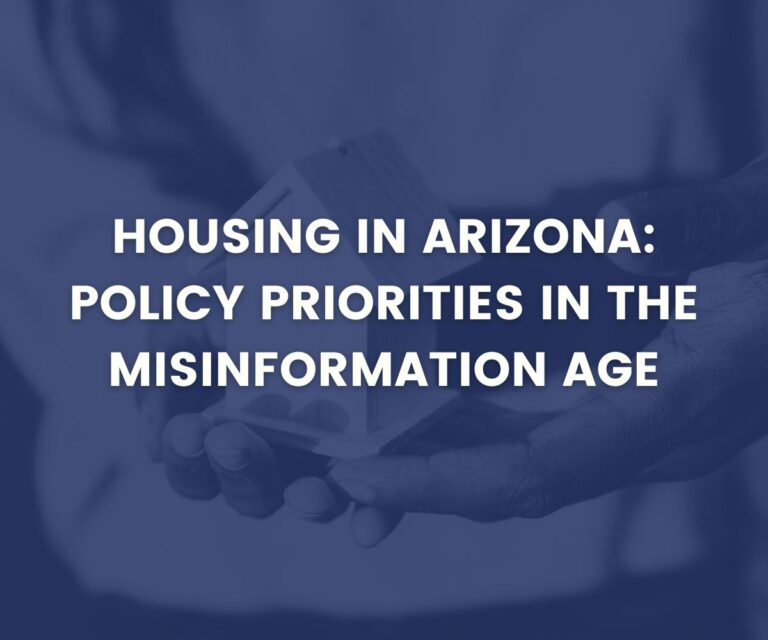
A People-Driven Economic Agenda During COVID-19
COVID-19’s rapid spread, the measures taken to contain it, and the uncertain duration of the crisis have sent shockwaves through the economy. As many businesses grind to a halt and workers are laid off, many economists acknowledge the US may indeed be in another recession.
The onset of the virus and its impacts was fast, and thus Arizona’s lawmakers at both the federal and state level must likewise take swift and bold action to lessen the negative impacts of this health and economic crisis. To sustain an economy that works for all Arizonans during this crisis, The Arizona Center for Economic Progress has developed A People-Driven Economic Agenda for Arizona During COVID-19. It advances policies to 1) pay Arizona’s affected workers, 2) shore up the social safety net in Arizona, 3) focus on Arizonans with health and economic barriers, and 4) preserve Arizona’s fiscal health.
Pay Arizona’s affected workers
COVID-19 has caused an unprecedented economic slowdown as people heed public health warnings and practice social distancing. Yet, most Americans cannot afford to be out of work for an extended period. And those that continue to work are often not afforded the compensation to take family or medical leave to care for themselves or a loved one who may become ill. Arizona’s labor market needs a broad and aggressive policy response to COVID-19, including an expansion of paid family and medical leave as well as large boosts to the unemployment insurance system.
Paid Medical and Family Leave
Arizonans should not have to choose between their health (or that of a family member) and keeping a job. “Stay home when you are sick” to prevent the spread of the virus is not an option for many workers in Arizona. Only a small fraction of American workers has access to paid family leave through their employers and fewer than 40 percent had access to personal medical leave through employer-provided short-term disability insurance. While recently enacted federal legislation has made some progress, it excludes many workers from both the paid sick leave and longer-term paid family leave policies. Whether it is at the federal level or at the State Capitol, lawmakers need to fill-in these gaps so that all Arizonans have access to paid sick and family leave necessary to enable them and their families to get through this health crisis.
Unemployment Insurance
When events are cancelled, services become limited, or businesses shutter altogether due to the public health crisis, workers will earn less or lose their jobs entirely, jeopardizing economic well-being and increasing the risk of recession. In this unprecedented and uncertain state of emergency, workers and their incomes should be protected by a broad, adequate, and responsive unemployment insurance (UI) system.
- Breadth: Eligibility for UI should extend to all workers laid off due to the public health emergency. This includes contractors and self-employed individuals (including gig workers), who traditionally fall outside UI coverage.
- Adequacy: The weekly unemployment benefit should be adequate for workers to afford their necessities and cost of living during the emergency. This means significantly raising Arizona’s abysmal (second lowest in the country) maximum weekly benefit to match the national average and that of neighboring states.
- Responsiveness: State and federal officials should lessen the barriers to enrolling in and maintaining UI benefits to the greatest extent possible and extend benefits for the duration of the health and economic crisis.
Shore up the social safety net in Arizona
Disasters like the COVID-19 pandemic demonstrate why Arizonans should have a strong social safety net. As the economic fallout continues, low-income individuals and those experiencing poverty will encounter steeper barriers to purchasing necessities and paying bills. Federal and state authorities should use their policy levers to assist low-income households in these tough times by expanding benefits and eligibility. In addition, strengthening the safety net is central to the public health response of social distancing as better-equipped and housed Arizonans will be able to stay safe during the emergency.
Food and nutrition assistance
Federal and state authorities should increase food access and affordability to the greatest extent possible. This includes swift enactment and implementation of boosts to and flexibility for the Supplemental Nutrition Assistance Program (SNAP), the Women, Infants and Children supplement (WIC), as well as increased access and support of the Arizona’s food banks and school meal programs as they work to meet increased demand. Low-income households generally spend all their income meeting daily needs such as shelter, food, and transportation, so every additional food assistance dollar enables an additional dollar spent on food or other items.
Housing affordability and stability
Many Arizonans already struggle to keep up with rising rents, and lost income during the public health emergency will further put tenants at risk of eviction. Keeping people in secure housing helps prevent the spread of the virus, both through self-quarantine and care of family members. To assist low-income households during this crisis, Arizona and the federal government should take measures to maximize housing stability. This includes:
- Rental assistance for households to maintain housing stability when reliable income is threatened;
- A statewide emergency eviction moratorium so tenants unable to work can stay home during an outbreak;
- A ban on late fee accrual during the emergency so tenants are not saddled with debt when the crisis abates;
- Responsive measures to ensure the safety and health of Arizona’s homeless population; and
- Continued production and subsidization to expand the affordable housing supply.
Family income supports
Cash assistance offered through the Temporary Assistance for Needy Families (TANF) program is vital for families to meet the cost of living during the crisis when stable income is threatened. In addition to a broad-based stimulus, federal and state authorities must broaden and deepen the reach of TANF to assist those who face significant economic barriers. Arizona has one of the strictest TANF programs in the country and must raise its benefits and broaden access to help families make ends meet. This includes increasing benefit payments (including the level and provision of one-time emergency funds), suspending work requirements, imposing a moratorium on benefit sanctions and terminations, implementing flexibility on eligibility definitions, and eliminating barriers to enrollment and re-enrollment.
Focus on Arizonans with social and economic barriers
In times of emergencies such as the COVID-19 outbreak, systemic societal inequities are exposed and often deepened. As federal, state, and local authorities respond to the virus’s spread, policy choices must acknowledge that economic security is fundamental to public health and safety. Bolstering an economy that works for all Arizonans means making special efforts to assist those that face the greatest barriers to overcoming the crisis, including the low-income households, the incarcerated population, student loan borrowers, tribal members, and undocumented immigrants.
Incarcerated population
For more than 40,000 Arizonans serving time in state prison, adhering to the CDC’s recommendation is especially arduous. Many are confined to group housing units or dorm-style sleeping areas, dependent on staff for soap, and escorted to the medical clinic by referrals or correctional officer approval. While the Arizona Department of Corrections released a plan to prevent the potential spread of coronavirus in state prisons, the state will require a more comprehensive approach as the virus continues to spread. This includes:
- Joining other states in working to reduce its prison population through medical furloughs and compassionate releases for inmates who are high-risk with 6 months or fewer left on their sentence;
- Implementing a transparent and fair continued screening, testing and treatment plan for housed inmates, not only new arrivals or correctional staff;
- and coordinating with local hospitals.
Student loan borrowers
For decades, state disinvestments in higher education have shifted costs onto students and their families with increased tuition and fees. Now, 43 million Americans owe $1.5 trillion in student debt with nearly 1 in 4 federal borrowers in default or struggling to stay current on their loans. Falling behind on payments comes with dire consequences, including negative credit reports, wage garnishment, and diminished options for economic stability. In Arizona over 230,000 borrowers are in repayment. As the fallout of the coronavirus continues to spread and impact wages, it is imperative that federal and state lawmakers enact equitable solutions for student borrowers regardless of their repayment status and origin of the loan, including forgiveness.
Undocumented immigrants
Juggling the fear of being deported with basic survival, 11 million undocumented immigrants feel an outsize impact of the spread of coronavirus. As businesses close, schools shut-down, and social distancing continues, undocumented immigrants have fewer supports to which to turn. Undocumented immigrants are more likely to face barriers to obtaining health care and other resources as many lack insurance and are ineligible for other programs. Economic relief packages must include provisions that uplift and support undocumented communities and provide relief from declines in cash-based employment. Economic stimulus packages should also include provisions that provide direct cash assistance and worker protections such as unemployment insurance and paid family and medical leave for undocumented immigrants.
Indian Country
As Arizona responds to the coronavirus it’s imperative to consider the barriers faced by Native communities. Tribal nations are more at risk of COVID-19 due to the elevated rates of chronic diseases and uneven access to healthcare services. Clean water is not always accessible in all tribal communities and social distancing is often more difficult due to more than one generation living in native homes. Tourism and hospitality sectors have been gravely impacted, leaving many tribal nations and members with reduced incomes. Tribal governments are unable to exercise taxing authority and rely on the federal government for fiscal support. The federal government should provide tribal nations with targeted fiscal support and resources as the crisis continues.
Preserve Arizona’s fiscal health
The pressures on Arizona’s state budget from the COVID-19 outbreak and the economic fallout are mounting and will quickly become severe. Congress must act aggressively now with aid to states now, before and our state enters a full-blown financial crisis. Arizona’s revenue projections for the coming fiscal year will soon plummet due to businesses and individuals taking a hit, knocking our state budget far out of balance and leaving absolutely no room for new tax cuts.
Lessons from the great recession
During the 2008 Great Recession, Arizona faced a budget shortfall exceeding $1 billion. Arizona, like other states, was forced to take actions during the Great Recession that made the recession worse and the recovery slower. Arizona suffered the largest cuts in the nation in public education funding for both K-12 schools and community colleges and universities. The across-the-board cuts resulted in thousands of Arizona children losing access to childcare and healthcare, the closure of state parks, reductions in public safety, and postponement of needed road repairs. Arizona has still not fully restored what it cut during the last recession.
Federal action
Aid to states like Arizona should arrive before states have begun to implement these cuts, since the goal is to prevent them. Congress must act aggressively now, before another state fiscal crisis, to provide more substantial emergency financial aid to states. The Families First Coronavirus Response Act is a good first step, providing about $36 billion emergency aid through increased federal Medicaid payments. But it’s grossly inadequate to address the fiscal crisis that states like ours are likely to face in the weeks and months ahead.
State response
Arizona will need to protect current revenue and stop all new tax cuts, credits and exemptions that only serve to make Arizona’s tax code more regressive. We must look to raise new revenues and make our tax code fairer for low- and middle-income Arizonans by repealing past special-interest tax breaks that benefit corporations and the wealthy. The more than $1 billion balance in the Rainy Day Fund should be used to protect funding for public education and safety net programs to help Arizonans weather this health and economic crisis.
Stimulus and relief targeting
An equitable approach to economic stimulus focuses on low-income Arizonans. Any relief plan that includes a basic cash transfer should focus on accessibility and eligibility for the 70 million Americans making under $50,000 per year, including:
- No tax filing burdens on populations earning less than $20,000, including the elderly, and people living with disabilities.
- Eligibility for people with no income and making less than $50,000 per year; including contract workers, gig-workers, and unhoused individuals. These populations drive economic activity during a downturn; stimulus to this population will translate into positive economic drivers while the country recovers from this crisis.
- Timely enough for low-income families to pay their bills now; if not made through direct payments, then through rent freezes, or assistance on utility payments.



